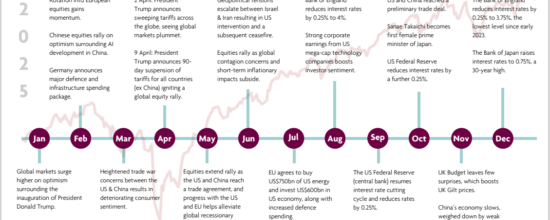Tariff uncertainty weighs on markets
Global share prices fell in March as uncertainty over Trump’s tariffs fuelled recession fears
Markets under pressure.
Global stock markets came under pressure in March amid growing concerns about the economic impact of President Donald Trump’s tariffs. US stocks dropped sharply and bond yields (which means bond prices rose) fell after Trump refused to rule out the possibility that his policies could trigger a recession. Long-threatened tariffs have pushed the country into a trade war, while shifting plans for new levies added to the uncertainty. Stock market falls, trade tensions and weakening consumer sentiment have reignited fears of a US downturn. The US central bank, the Federal Reserve (Fed), cut its growth forecast, warning that Trump’s tariffs were driving up prices. European bond yields rose on news of increased defence spending, which raised expectations of higher government borrowing and inflation. UK shares also dropped amid uncertainty over US trade policy.The Fed held interest rates steady but signalled cuts are likely later this year, keeping its key borrowing rate in a range of 4.25% to 4.5%. US inflation came in at 2.8% in February, down from 3% in January. The US labour market has been sluggish, with 151,000 jobs added in February and unemployment rising to 4.1%. Consumer sentiment tumbled in March as long-term inflation expectations reached a 32-year high.
UK inflation edges down.
UK inflation fell to 2.8% in February, down from 3% in January. With inflation still elevated, the Bank of England held interest rates at 4.5%. While interest rates have been cut three times since last summer, persistent inflation has raised concerns they may need to stay higher for longer. Chancellor Rachel Reeves used the Spring Statement to announce major welfare cuts and higher defence spending. The Office for Budget Responsibility forecast economic growth of just 1% in 2025. Figures showed the economy shrank by 0.1% in January, mainly due to falling manufacturing output. Wage growth remained strong at 5.8%, slightly down on the previous month but still outpacing inflation. Unemployment held steady at 4.4%. On a more positive note, business surveys suggest tentative signs of recovery, driven by financial and consumer services.
EU announces retaliatory tariffs.
After Trump imposed 25% tariffs on steel and aluminium imports, the EU responded with duties on €26 billion worth of American goods. The European Central Bank (ECB) cut its deposit rate by a quarter-point to 2.5% and lowered growth forecasts for this year and next amid tariff uncertainty. Euro area inflation fell to 2.3% in February, the first drop in four months. Unemployment remains at a record low, though analysts expect it to rise in the months ahead.
Asia shows signs of resilience.
Stronger-than-expected data helped Asian markets as China’s economy showed signs of improvement. Retail sales rose 4% and industrial production climbed 5.9% in January and February. But the housing market remains a drag, with real estate investment down 9.8%. Consumer inflation also fell more than expected, to below zero for the first time in 13 months. Elsewhere in Asia, Japan’s economy also offered some positive signals, with exports rebounding and business confidence improving. South Korea reported a rise in industrial output, while India’s economy continued to grow steadily, supported by strong domestic demand.


